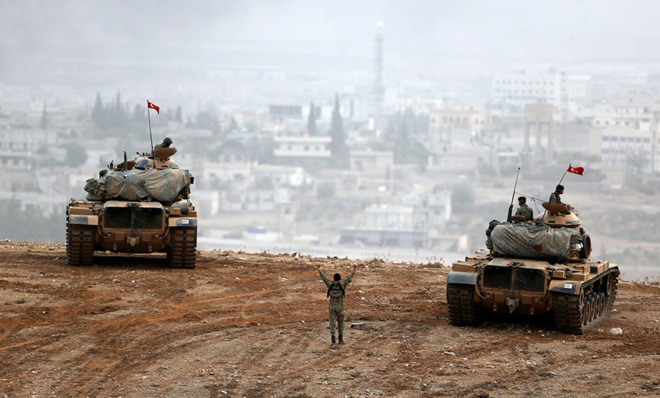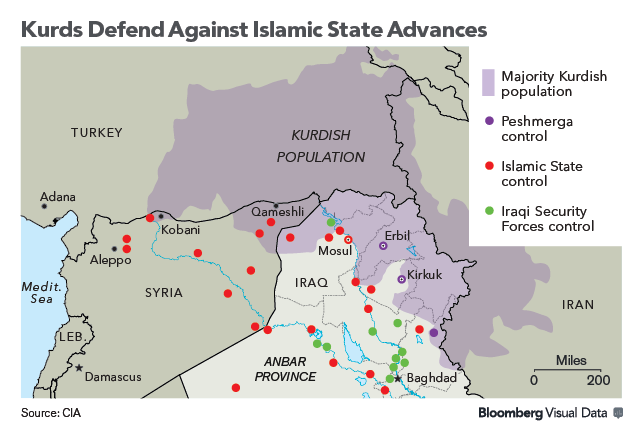Will Kobani be ISIS's Waterloo?
The Syrian-Turkish border town has become a potential, unexpected turning point in the battle against ISIS


A free daily email with the biggest news stories of the day – and the best features from TheWeek.com
You are now subscribed
Your newsletter sign-up was successful
Islamic State of Iraq and Syria (ISIS) militants have been trying to capture the Syrian town of Kobani for about a month. On Oct. 7, right after the U.S. started bombing ISIS targets around the primarily Kurdish border town, Turkish President Recep Tayyip Erdogan warned that "Kobani is about to fall."
That dour assessment was shared by U.S. military. "Airstrikes alone are not going to fix this, not going to save the town of Kobani," Pentagon spokesman Rear Adm. John Kirby said Oct. 8. "We know that. We know that ISIL is going to continue to grab ground and there are going to be villages and towns and cities that they take." At that point, ISIS fighters had captured part of the town and hung their black flags on two buildings.
Well, two weeks and more than 120 U.S. airstrikes later, the Kurds in Kobani are still fighting — and now they're finally getting much-needed reinforcements.
The Week
Escape your echo chamber. Get the facts behind the news, plus analysis from multiple perspectives.

Sign up for The Week's Free Newsletters
From our morning news briefing to a weekly Good News Newsletter, get the best of The Week delivered directly to your inbox.
From our morning news briefing to a weekly Good News Newsletter, get the best of The Week delivered directly to your inbox.
Turkey, whose tanks have been sitting idly amassed within sight of Kobani, says it will now allow Iraqi Kurdish reinforcements to cross through Turkey into Kobani. The shift in policy — Turkey has prevented Turkish Kurds from sending arms or fighters to Kobani — followed the U.S. decision on Sunday to airdrop weapons, ammunition, and medicine to the Kobani Kurds.
The U.S. airdrops and increased airstrikes, mixed with "the stubborn, almost suicidal resistance of Kobani Kurds," has "shifted the balance" in the battle, reports The Daily Beast's Jamie Dettmer from across the Turkish border. "Morale is lifting." For the Kurds in Kobani, this fight is "every bit as symbolic and important as the Alamo once was to Americans," he adds, except that "there's now a feeling that, unlike the Alamo, it may not end with a massacre."
If ISIS loses, instead of being the Kurds' Alamo it could be ISIS's Waterloo.
Syria's Kurdish defense forces (YPG) may actually defeat ISIS, especially if the Iraqi Kurdish peshmerga fighters arrive to help. If ISIS does capture Kobani, it will control a broad, strategically useful area along Turkey's border, connecting its Syrian strongholds around Aleppo and Raqqa, the red dot southeast of Kobani on this helpful map from Bloomberg, plus areas near the border with northern Iraq:
A free daily email with the biggest news stories of the day – and the best features from TheWeek.com

But Kobani is also symbolically important for ISIS. The Sunni militant group has poured ample fighters and armaments into crushing this unexpected show of resistance. The U.K.-based Syrian Observatory for Human Rights says that the Kobani resistance has killed 374 ISIS attackers while ISIS has killed 258 YPG fighters, 20 Kurdish civilians, and nine Arab Syrians. If ISIS loses now, it loses big.
I use Waterloo in the common English meaning of "a decisive defeat or failure," or "the beginning of the end," not as a direct military analogy.
When Napoleon engaged the British and Prussian forces near the Belgian town of Waterloo in 1815, it was a desperate gamble to forestall a larger and better-coordinated attack from Europe's major powers. ISIS on the other hand had every expectation of steamrolling over Kobani as it has larger and ostensibly better-protected cities during its three-month rampage through Iraq and Syria.
Also unlike Napoleon's Waterloo, a loss at Kobani wouldn't spell the end of ISIS, not by a long shot. But it would rob the group of its mystique as an apparently superhuman force that has easily vanquished the U.S.-trained Iraqi army and Syria's armed forces, showing that the would-be caliphate can be beaten by a smaller and less-well-armed opponent. That would be an important symbolic victory for the Kurds and other armed factions battling ISIS on the ground, but also a potentially big blow to ISIS's successful recruitment drive. The group's big selling point has been endless success.
And beyond symbolism, ISIS is losing people and equipment in Kobani. The U.S.-led air campaign wasn't designed to destroy ISIS anytime soon, but as Gen. Lloyd Austin, the head of U.S. Central Command, told reporters on Friday, "the enemy has made a decision to make Kobani his main effort," and as long as ISIS "pours legions of forces there into the area, we'll stay focused on taking him out."
The battle, added White House spokesman Josh Ernest, "has created a rather target-rich environment around Kobani for American and coalition airstrikes that when they see clusters of fighters or they see depots of material or supplies that are critical to the success of those fighters, it's easier to take them out."
Before ISIS attacked, Kobani was the center of a farming area of about 400,000 inhabitants. If the Kurds win, it may be remembered as a major turning point.
Peter has worked as a news and culture writer and editor at The Week since the site's launch in 2008. He covers politics, world affairs, religion and cultural currents. His journalism career began as a copy editor at a financial newswire and has included editorial positions at The New York Times Magazine, Facts on File, and Oregon State University.
-
 The Olympic timekeepers keeping the Games on track
The Olympic timekeepers keeping the Games on trackUnder the Radar Swiss watchmaking giant Omega has been at the finish line of every Olympic Games for nearly 100 years
-
 Will increasing tensions with Iran boil over into war?
Will increasing tensions with Iran boil over into war?Today’s Big Question President Donald Trump has recently been threatening the country
-
 Corruption: The spy sheikh and the president
Corruption: The spy sheikh and the presidentFeature Trump is at the center of another scandal
